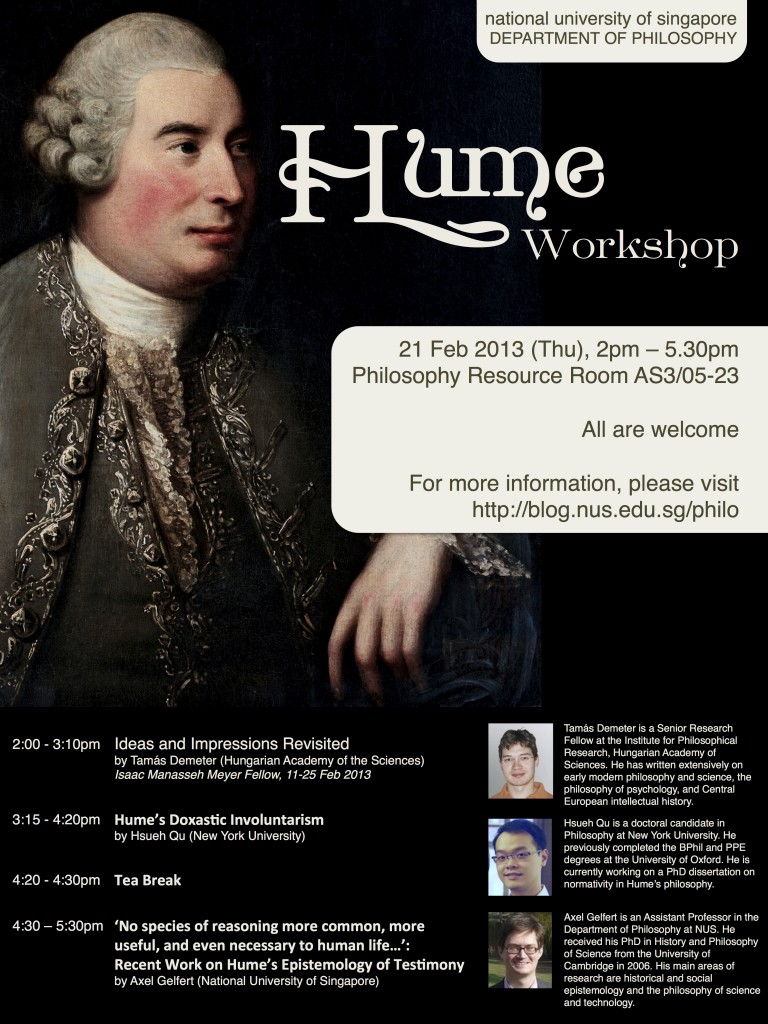“Bradley, Hume, and Identity-in-Difference” by Donald L. M. Baxter (2.00-3.15pm)
In Appearance and Reality Bradley refers to what he calls “the old dilemma”: that attributions of identity are either so tautologous as to fail to be judgments, or are contradictions. Bradley’s approach is to appeal to identity-in-difference. “It takes two to make the same.” We nowadays will hear such claims in a Fregean way and will hear Bradley as failing to distinguish the truth of an identity statement from its informativeness. I suggest rather that we hear Bradley’s claim in a Humean way. Hume gave a compelling argument for identity-in-difference, though not in those terms. He raises a problem that cannot be understood nor addressed in the Fregean way, that is very like Bradley’s old dilemma. I’ve called it “Hume’s Difficulty concerning Identity.” How can we conceive there to be a single thing, on the one hand, and several distinct things, on the other, that are somehow identical? In a previous discussion of Bradley, I’ve called this same problem the “Problem of Complex-Unities.” Both Bradley and Hume thought a solution that did not conceal some contradiction was impossible. I myself think that Hume’s presentation of the problem suggests a genuine solution along the lines of my theories of Many-One Identity and of Aspects. For now, though, I just want us to hear Bradley’s old dilemma in a Humean way.
“Why Distinctions of Reason are a Real Problem for Hume’s Separability Principle” by Hsueh Ming Qu (3.30-4.45pm)
Commentators such as Kemp Smith (1941, p.256), Mendelbaum (1974, p.246), and Bricke (1980, p.71) have taken the distinctions of reason to pose either a counterexample to or a limitation of scope on the Separability Principle, a suggestion that has been convincingly addressed by various accounts such as Garrett (1997), Hoffman (2011), and Baxter (2011). However, I argue in this paper that there are two notions of ‘distinction of reason’, one between particular instantiations (token distinctions of reason) and one between general ideas (type distinctions of reason). Discussion of the distinctions of reason in the secondary literature has without fail focused on token distinctions of reason, but I will argue that type distinctions of reason prove problematic for Hume’s Separability Principle. In the end, I find a way around this problem that is consonant with Hume’s account of general ideas, but which can hardly be said to be an account which he explicitly or even implicitly endorsed.
“The Concealed Operations of Custom: Hume’s Treatise From The Inside Out” by Jay Garfield (5.00-5.45pm)
I am about to start work on a book of this title. I want to share with you the guiding principles that motivate my reading of Hume in that book and the way they will inform my interpretation of Hume’s project. This is not even work-in-progress; it is work-in-imagination. So, I am looking for advice.
About the Speakers:
 Donald L. M. Baxter is Professor and Department Head in the Department of Philosophy at the University of Connecticut. He received his Ph.D. from the University of Pittsburgh in 1984. He works in Metaphysics and Early Modern Western Philosophy. His monograph is Hume’s Difficulty: Time and Identity in the Treatise (Routledge 2008). He recently co-edited with Aaron J. Cotnoir an anthology on the metaphysics of parts and wholes entitled Composition as Identity (Oxford University Press 2014).
Donald L. M. Baxter is Professor and Department Head in the Department of Philosophy at the University of Connecticut. He received his Ph.D. from the University of Pittsburgh in 1984. He works in Metaphysics and Early Modern Western Philosophy. His monograph is Hume’s Difficulty: Time and Identity in the Treatise (Routledge 2008). He recently co-edited with Aaron J. Cotnoir an anthology on the metaphysics of parts and wholes entitled Composition as Identity (Oxford University Press 2014).
 Hsueh Qu joined the Philosophy Department at NUS in 2015. Previously, he received his Ph.D. from New York University, and completed his undergraduate and B.Phil. at Oxford University. He is originally from Malaysia. His research interest is Early Modern, primarily the scholarship of David Hume; he also has interests in Kant, Ethics, and Metaphysics. In this, as in all his other endeavors, he asks you to forgive him his failings, for he is only Humean after all.
Hsueh Qu joined the Philosophy Department at NUS in 2015. Previously, he received his Ph.D. from New York University, and completed his undergraduate and B.Phil. at Oxford University. He is originally from Malaysia. His research interest is Early Modern, primarily the scholarship of David Hume; he also has interests in Kant, Ethics, and Metaphysics. In this, as in all his other endeavors, he asks you to forgive him his failings, for he is only Humean after all.
 Jay L Garfield is Kwan Im Thong Hood Cho Professor of Humanities and Head of Studies in Philosophy at Yale-NUS College, Professor of Philosophy at the National University of Singapore, Recurrent Visiting Professor of Philosophy at Yale University, Doris Silbert Professor in the Humanities and Professor of Philosophy at Smith College, Professor of Philosophy at Melbourne University and Adjunct Professor of Philosophy at the Central University of Tibetan Studies. He earned his PhD in Philosophy at the University of Pittsburgh. Garfield’s most recent books are Engaging Buddhism: Why It Matters to Philosophy (2015), Madhyamaka and Yogācāra: Allies or Rivals (with Jan Westerhoff 2015), The Moon Points Back: Buddhism, Logic and Analytic Philosophy (with Yasuo Deguchi, Graham Priest and Koji Tanaka 2015), Moonpaths: Ethics in the Context of Conventional Truth (with the Cowherds 2015) and Western Idealism and its Critics (2011). His book Examination of the Percept: Dignāga’s Alaṃbanāparikṣā and its Commentaries (with Douglas Duckworth M David Eckel, Yeshes Thabkhas and Sonam Thakchöe) is under review and his book with Nalini Bhushan on Minds Without Fear: Philosophy in the Indian Renaissance is under contract. His next big project is a book on Hume’s Treatise to be called The Concealed Operations of Custom: Hume’s Treatise From The Inside Out.
Jay L Garfield is Kwan Im Thong Hood Cho Professor of Humanities and Head of Studies in Philosophy at Yale-NUS College, Professor of Philosophy at the National University of Singapore, Recurrent Visiting Professor of Philosophy at Yale University, Doris Silbert Professor in the Humanities and Professor of Philosophy at Smith College, Professor of Philosophy at Melbourne University and Adjunct Professor of Philosophy at the Central University of Tibetan Studies. He earned his PhD in Philosophy at the University of Pittsburgh. Garfield’s most recent books are Engaging Buddhism: Why It Matters to Philosophy (2015), Madhyamaka and Yogācāra: Allies or Rivals (with Jan Westerhoff 2015), The Moon Points Back: Buddhism, Logic and Analytic Philosophy (with Yasuo Deguchi, Graham Priest and Koji Tanaka 2015), Moonpaths: Ethics in the Context of Conventional Truth (with the Cowherds 2015) and Western Idealism and its Critics (2011). His book Examination of the Percept: Dignāga’s Alaṃbanāparikṣā and its Commentaries (with Douglas Duckworth M David Eckel, Yeshes Thabkhas and Sonam Thakchöe) is under review and his book with Nalini Bhushan on Minds Without Fear: Philosophy in the Indian Renaissance is under contract. His next big project is a book on Hume’s Treatise to be called The Concealed Operations of Custom: Hume’s Treatise From The Inside Out.
ALL ARE WELCOME



